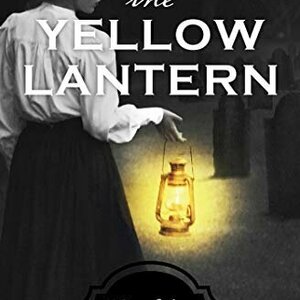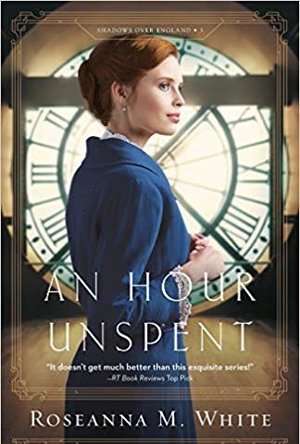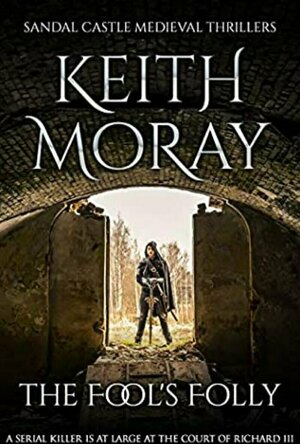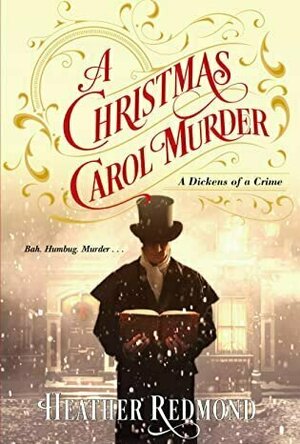
A Christmas Carol Murder (A Dickens of a Crime #3)
Book
The latest novel from Heather Redmond’s acclaimed mystery series finds young Charles Dickens...
Historical Mystery
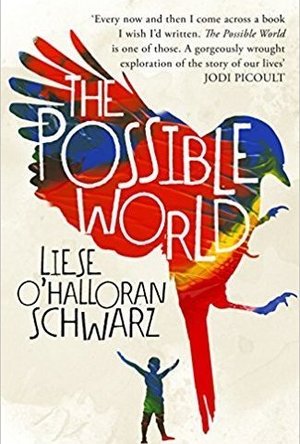
The Possible World
Book
An astonishing, deeply moving novel about the converging lives of a young boy who witnesses a brutal...
Historical Fiction
Purple Phoenix Games (2266 KP) rated Chronicles of Crime: 2400 in Tabletop Games
Nov 17, 2021
Chronicles of Crime: 2400 (which I shall shorten to 2400 for the duration of this preview) is an app-assisted campaign, murder-infested, cooperative storytelling game for one to four players. If you are familiar with the original Chronicles of Crime, you already mostly know how to play 2400 (there are a few new mechanics here). However, should ye be of the uninitiated, allow me to set the stage for this incredible gaming experience.
DISCLAIMER: We were provided an advance retail copy of this game for the purposes of this preview. These are retail copy components, so they should be exactly what you would receive in your copy. Also, it is not my intention to detail every rule in the game, as there are just too many. You are invited to download the rulebook, purchase directly from the publisher, or through any retailers stocking it after fulfillment. -T
To setup, place the Evidence Board in the middle of the table and the Home Location Board near. Keep all the decks of cards nearby (shuffled or unshuffled, whatever is your liking) as well as the alphabetically-labeled, double-sided Location Boards. Place out the Implant Board and the Raven card within reach (new to 2400). Fire up the Chronicles of Crime app, choose “2400,” and then choose the case you would like to play. The app will walk players through the additional setup steps for the case being played. For this solo preview the photos represent happenings in the Tutorial scenario. Also, to be completely upfront I got a perfect 100/100 for a final score… for the introductory Tutorial. Autographs can be purchased at the end of the preview.
Each of the cases will involve players traveling to different Location Boards and meeting Characters at these locations. Many cases will be involving several Special Items and, new for the 2400 version, augments to the main character, Kalia Lavel, and her cybernetically-enhanced pet Raven. The Raven (unnamed in the game) acts as a portable computer, able to access information across the web and provide insight into certain aspects of the case being solved.
By using the app and scanning the QR codes on the boards and cards players will be learning about the case, viewing the scene of the crime(s), inspecting items, chatting up locals for information, and also new for 2400: visiting new Cyberspace Locations (a la The Oasis in Ready Player One)! With so many new additions to the CoC series here in the 2400 chapter, seasoned vets will find something for which they can be excited.
Play will continue not so much in “rounds” but until the players have enough evidence and a good handle on the situation enough to return Home to recharge, or visiting HQ to divulge case information by scanning answers to their questions about the case. The app then assesses the accuracy of the answers and outputs a score. For reference, though I did receive 100/100 on my first play of 2400 I did only receive a 70/100 on my first runthrough of the original Chronicles of Crime, so playing this style of game several times seems to improve how one plays.
Components. As most items in the box of the game are card or cardboard-based, and all really great quality, I will speak on other component items. Firstly, the art and art style throughout the game is simply stunning. I mean look at those Location cards and character art! This art really speaks to me and it says, “I’m gorgeous.” As a side note, I think I will be contacting Lucky Duck Games to get my hands on the font used on the Evidence Category cards. It’s just a perfect choice in this setting.
The app. I have only great things to say about the app. It’s the same app that you would use for all Chronicles of Crime games, and operates the exact same way. For me it has been flawless to use and just a joy to bring technology into the gaming world, especially for a game set in the year 2400. I am obviously no purist game enthusiast, as I enjoy these hybrid model games. Once you play with the app you will see how ingenious a system it really is. The app coupled with the nondescript cards and other components in the game make for infinite storytelling possibilities that can only be limited by creativity and time constraints. I love the components in the box AND the marvelous app.
Gameplay for me is also just glorious. I love being able to sit down, setup the game, and let the app tell me what’s going on. So what should I do first? Oh, let’s mosey on down here to this Location Board and drum up some information. Ooh I found an Item! I should have the Raven scan it for any historical information. Hmm, it registers as being hot? Okay, time to go back to that location and speak with the other person who was in there. OH CRAP, I wasted too much (in game) time and now that other person is gone?! Uh oh, I better stop messing around here…
It’s just amazing, and I love this family of games. I am so stoked to delve more into 2400 and discover more shenanigans happening in futuristic Paris. My implants (no jokes here please), Raven, and I are out to solve all the cases and beg for more. If you are looking for a game that uses a hybrid board game/app model, are a fan of this setting, or just want to have a really great experience playing a game, I urge you to consider Chronicles of Crime: 2400. It has everything I love in a unique game and I just can’t get enough! Oh, and for me, this is the best one of the bunch. I don’t know what it is exactly that I love so much, but it adds the right amount of extra stuff to CoC that I just feel like playing these scenarios endlessly. That is, until I have run out of scenarios and have to cry to LDG or fans to create more and more. If only I were more creative.
MaryAnn (14 KP) rated The Yellow Lantern in Books
Nov 4, 2019
Step into True Colorsa new series of Historical Stories of Romance and American Crime
In Massachusetts in 1824, Josephine Clayton awakes on the table of the doctor shes assisted all these months. She was presumed dead by all and has become the doctors next corpse for his medical research. Frightened, the doctor tries to kill her, but Josephine begs to be spared. A deal is struckJosie will leave her village and work at a distant cotton mill. All the while, shell await her true missionposing as a mourner to help his body snatcher procure her replacement. At the mill though, Josie is praised for her medical remedies among the mill girls, gaining attention from the handsome factory manager Braham Taylor. Yet, when Brahams own loved one becomes the prey for the next grave robbing, Josie must make a choice that could put her dark past behind her or steal away the promise of any future at all. What price will Josie pay for love when her secrets begin to unravel
My Thoughts: This is a very unique mystery that will captivate readers from the beginning. A fictional novel based on true facts, this story gives the reader an insight to the horrific things that happened at the turn of the century.
This story will certainly keep the readers' attention. The author has created very believable characters. The readers will either like them or hate them.
This is a wonderful story for those who like a good mystery. This one has many twists in the plot to keep the readers on their toes.

Manhattan Beach
Book
The long-awaited novel from the Pulitzer Prize-winning author of A Visit from the Goon Squad,...
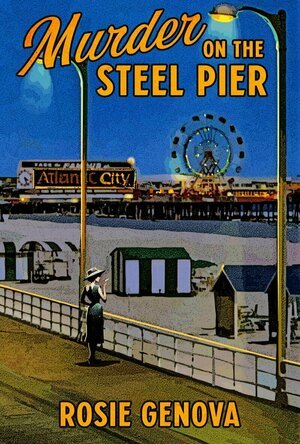
Murder on the Steel Pier (A Tess Mancini Time Travel Mystery #1)
Book
Greetings from the Nifty Fifties… The morning after a blowout birthday celebration in Atlantic...
Historical Mystery Time Travel
MaryAnn (14 KP) rated An Hour Unspent (Shadows Over England, #3) in Books
Mar 5, 2019
Evelina Manning has constantly fought for independence but she certainly never meant for it to inspire her fiancé to end the engagement and enlist in the army. When the intriguing man who saved her returns to the Manning residence to study clockwork repair with her father, she can’t help being interested. But she soon learns that nothing with Barclay Pearce is as simple as it seems.
As 1915 England plunges ever deeper into war, the work of an ingenious clockmaker may give England an unbeatable military edge—and Germany realizes it as well. Evelina’s father soon finds his whole family in danger—and it may just take a reformed thief to steal the time they need to escape it.
My Thoughts: This is an intriguing and entertaining book. From the first chapter to the last, it has the reader completely enamored. This is the third book in the series and if the reader like myself hasn't read the first two, they will be able to read along easily. The setting takes place during the first world war and grabs the readers attention from the first page. The characters are fun, witty and down to earth.
I believe that this book is to teach us what family really is and to appreciate and to hold on tight and love our famililies. It's a book about serving others and putting family first.
I believe that readers will truly enjoy this novel, especially those who love historical fiction.
Deborah (162 KP) rated Seeking Mr Hare in Books
Dec 21, 2018
Overall it was very well written. As well as the historical Mr Hare, Thomas de Quincey (Confessions of An English Opium Eater) makes an appearance. The novel starts with Hare still held in gaol and we see him turn King's Evidence and be allowed to go free while his partner in crime (pun intended!) goes to the gallows. A plaster cast is taken of Hare's head and a phrenologist has a good feel of his skull!
Being somewhat notorious and with many people being outraged with his perceived escape from justice, Hare has some difficulty in getting away and he has little money and few possessions to his name.
So much for Hare's half of the narrative. His account is interspersed with chapters in the form of letters or journal entries from Mr Speed, a former police detective. He had been charged by a Lord with an interest in science and criminology to track Hare down. This is the weak point for me - I don't quite understand why. Hare was imprisoned while the trial was going on, so why is it only after he is released he has to be tracked down. What is Speed supposed to do for him employer if and when he catches up with Hare? What exact;y does he want to know? This isn't clear to me and so the book as a whole rather loses its point. I can't say much more as it will end up spoiling things, but the ending did seem very anti-climactic to me.
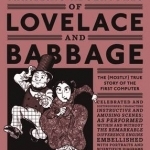
The Thrilling Adventures of Lovelace and Babbage: The (Mostly) True Story of the First Computer
Book
'So impossibly funny, clever, demented, charming and altogether wonderful that I was a convert...
ClareR (6081 KP) rated The Fool’s Folly in Books
Jun 9, 2020
This story is set at Sandal Castle, the seat of John de la Pole, King Richard’s heir (and now it becomes clear why Henry VIII wanted to get rid of the de la Pole family!). De la Pole’s jester is murdered, and the newly appointed judge, Sir Giles Beaton, is asked to get to the bottom of the mystery. What starts out as a seemingly open and shut case, ends up being the start of a killing spree. Giles has to wonder if the deaths are connected, and whether this has something to do with a plot against the King and his heir.
It’s a bit gruesome at points - I liked this, I will admit. Medieval postmortems wouldn’t have been for the more sensitive observer (or reader!), I’m sure. I do have a bit of a thing for historical fiction, and a newly developed respect for crime and mysteries. I appreciate the attention to detail, and the research that must have occurred in writing this book, it feels very authentic.
I haven’t read the first book in this series, but it didn’t affect my reading enjoyment at all. In fact it has made me want to read the first in the series as well!
Many thanks to Sapere Books for sending me a copy of this book to read and review!

